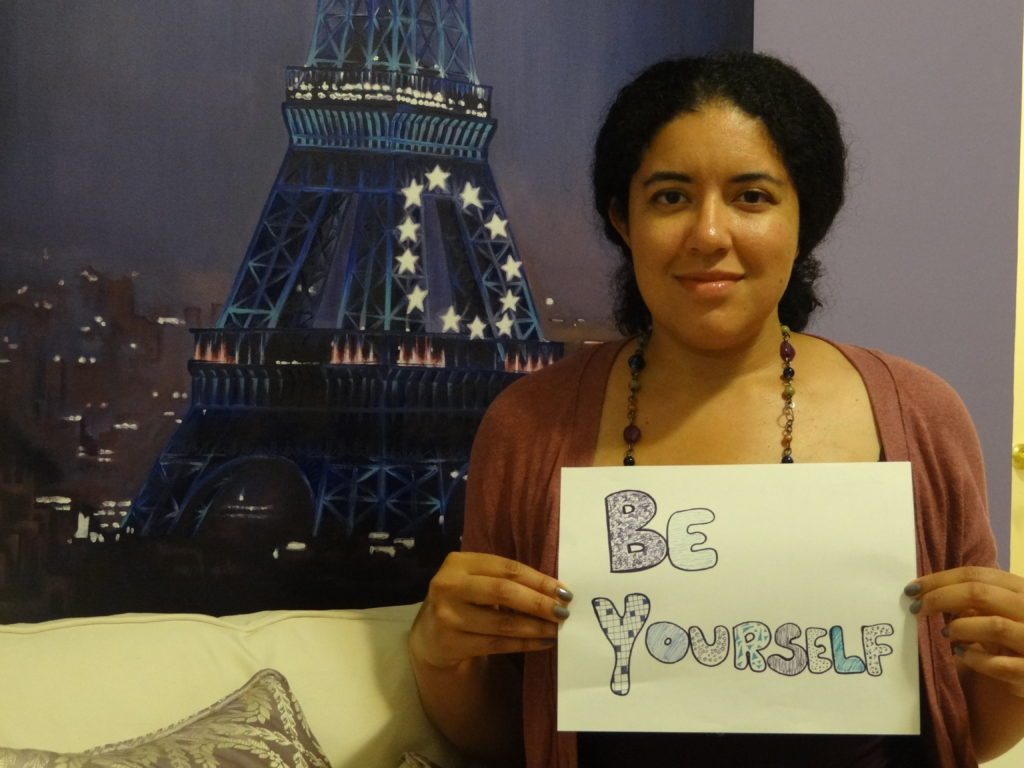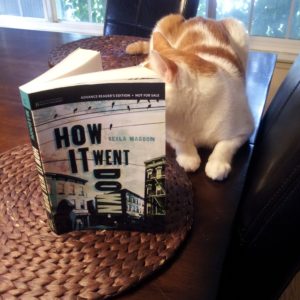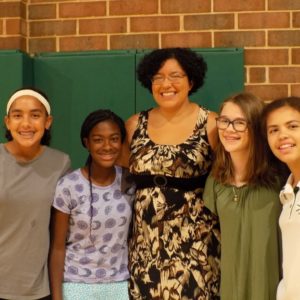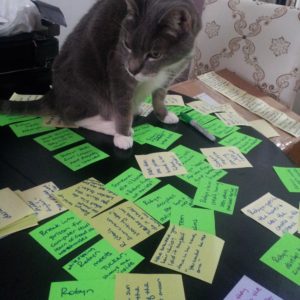General Questions
General Questions
“Kekla” is a Bassa word meaning “sunrise” or “morning star.” Bassa is a language spoken in rural Cameroon, West Africa, where Kekla’s dad was born and raised. Kekla is the only “Kekla” she knows. Well, the only human “Kekla.” There is a gorilla in the Atlanta Zoo named after her (literally).
How much time do you have? The short answer: Everything inspires me. The real answer: This is a hard question to answer directly. I don’t always know what my inspiration is for writing a certain book or creating a certain character—that’s what makes inspiration different from facts or ideas. Sometimes inspiration just comes out of nowhere! I carefully observe the world around me, then I translate the most compelling things I’ve seen and experienced into stories. This does not mean I write about things that really happen. I use my imagination A LOT. My imagination is my best tool for being creative, and it works best when I feel inspired. I am inspired by people I meet, things I’ve seen and done in the past, my own feelings and fantasies about things that could happen, and much, much more.
I love visiting schools and meeting my readers. Please stop by my Speaking page. There, I list the various programs I offer to schools and libraries, and you can see how to contact me with a more detailed request. I hope to see you soon!
That depends on whether you are an adult or a teenager. I do provide manuscript critiques for adult writers, for a fee that is based on the length and type of work you would like me to read. Please email me with a description of your project, and we’ll go from there.
If you are a teen, my best advice to you is to keep writing. Receiving feedback is a really important part of becoming a published author, but before you start getting notes on your work, it is even more important that you practice and practice until you are very comfortable with your voice and your stories. Even if you are destined to become the greatest writer in the world someday (this could happen—don’t sell yourself short!), the very first things you ever write will not be your best work. And even if you are destined to become the greatest writer in the world someday, nothing you write will be perfect from the first draft. When you start showing your work to other writers, even if they love it, they will always offer suggestions for how to make it better. They might say things like “I don’t understand what you meant in this sentence,” or “this character is not believable,” or “you should delete this entire chapter.” The things they say may hurt your feelings a little. Or a lot. You need to be ready for that. And you need to understand that anyone who takes the time to critique your work is doing so because they care, and because they want to help you learn. This can be hard to accept, no matter how old you are. You need to be ready, and you need to believe that, no matter what anyone says about your writing, what you have to say is important. Becoming a better writer simply means learning to communicate your point of view in the best way possible. When you feel ready to share your work, consider taking writing classes if you can, or join a writing club if you have access to one in your community. If you can’t do these things, do not fret. Just keep writing on your own. Practice is how you get better. So, keep writing!

About How It Went Down
About How It Went Down
No. All of the characters and incidents that appear in How It Went Down are fictional.
However, the fictional shooting of Tariq Johnson that occurs in my novel is similar to real incidents of violence that have occurred around the country in recent years. If you follow the real-world news, you may very well recognize some of the issues and discussion that come up between characters in my novel. Part of why I wrote the novel was to explore these issues in the context of fiction. I hope that it might add a new perspective to the important conversation about these tragedies.
Part of what is intriguing and challenging about the news coverage that follows a controversial shooting is the uncertainty. Everyone—including members of the media—takes the limited fact act are available and creates a narrative about the incident that makes sense to him or her. The controversy deepens when those narratives conflict—when people have different opinions about what really happened. It is hard to know what really did happen in many of these cases, and it is always impossible to know exactly what was going on in a person’s head when he or she made the choice to pick up a gun and what led him or her to pull the trigger. It was intriguing to me to explore how not just one person but a whole community might respond to a controversial shooting that occurred in their own backyard. I thought it would be harder to explore the nuances of this type of controversy if I wrote from only one viewpoint.
About X: A Novel
About X: A Novel
It was great! I was honored that Ilyasah chose me to collaborate with her on a book about her father. She had a vision for the story she wanted to tell, and she wanted to work with someone who had written lots of novels before. That’s me! We met in person to talk about her ideas for the book, and then I worked on drafting chapters and scenes to share with her. Then we worked on the manuscript together with our editor, until it was as good as it could be.
We know today that Malcolm X grew up to be a famous and influential speaker and leader. But when he was a teenager, he had no idea of the amazing future that was in store for him. He felt worthless and fearful, and he made a lot of bad choice because of those feelings. This novel shows his path from being someone who thinks he has no potential to being someone who the whole world remembers, and it is amazing to think that such a powerful future could be in store for YOU too!
About The Rock and the River/Fire in the Streets
About The Rock and the River/Fire in the Streets
The complete answer to this question could fill a whole book! Luckily, I am writing such a book right now. In the meantime, here is a shorter answer to get you started:
The Black Panther Party was a nationwide organization that existed in black communities in the United States from 1966 until about 1982. The Panthers played several roles in these communities: they were civil rights activists, community organizers, and could even be called a political party. The Panthers created community service programs like free breakfast programs and free health clinics for people in need, and they patrolled poor black neighborhoods to protect citizens from police brutality, which was common at the time. Most of the Panthers were young black Americans who had grown very frustrated with racism in their communities, so they decided to take action to change the way people thought about race in America. Unlike the civil rights movement activists before them (who all committed to non-violent passive resistance) the Panthers carried guns and believed equality should be defended by any means necessary, a philosophy which remains controversial to this day.
The Rock and the River is a fictional (made-up) story, but it is based on some real historical events. None of the main characters in the book are named for real people. The book does refer to some real people, though, like the Rev. Dr. Martin Luther King, Jr. and Fred Hampton, who was the leader of the Chicago Black Panther Party. I consider Sam’s story real because a lot of young teenagers faced the choice that Sam faces in the book—whether to remain a part of the civil rights movement, or join the Black Panther Party.
I answer this question a lot. If you read some of my interviews and/or watch my videos, you will see that I have found lots of ways to talk about my inspiration for The Rock and the River, and why it was a meaningful book for me to write. Here are the highlights: I like history. I think it is important to know where we as a society have been so that we can better understand how we got to where we are, and where we’re going from here. America has come a long way since the civil rights era, in some respects, and not far enough in others. Writing this book helped me see those parallels very intensely, and it made me wonder what I would have done, what choice I would have made if I had been around when the civil rights era went through the transition from non-violent protest to militant community organizing. Exploring that question fueled my writing process. Plus, 1968 seems like it is longer ago than it really was. Lots of people who were children, teenagers, young adults and even middle aged adults in 1968 are alive and can tell their own stories about these difficult days. It was important to me to begin an intergenerational conversation with young people and adults about this recent history and how it affects us today.



